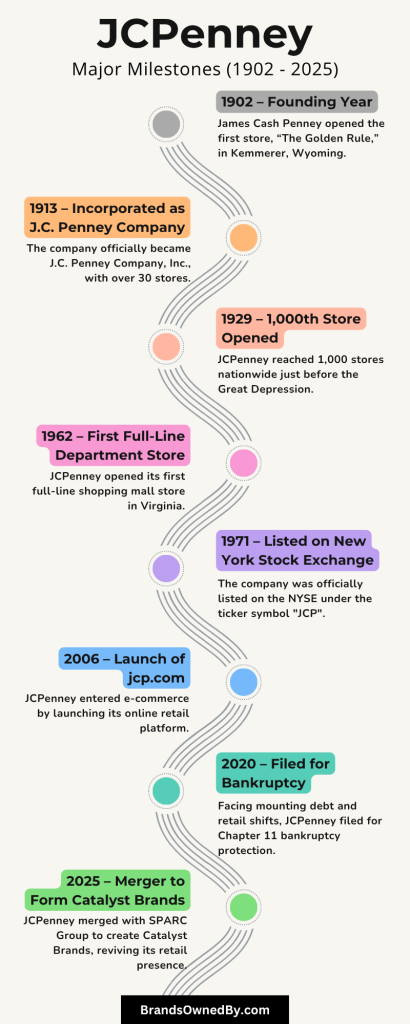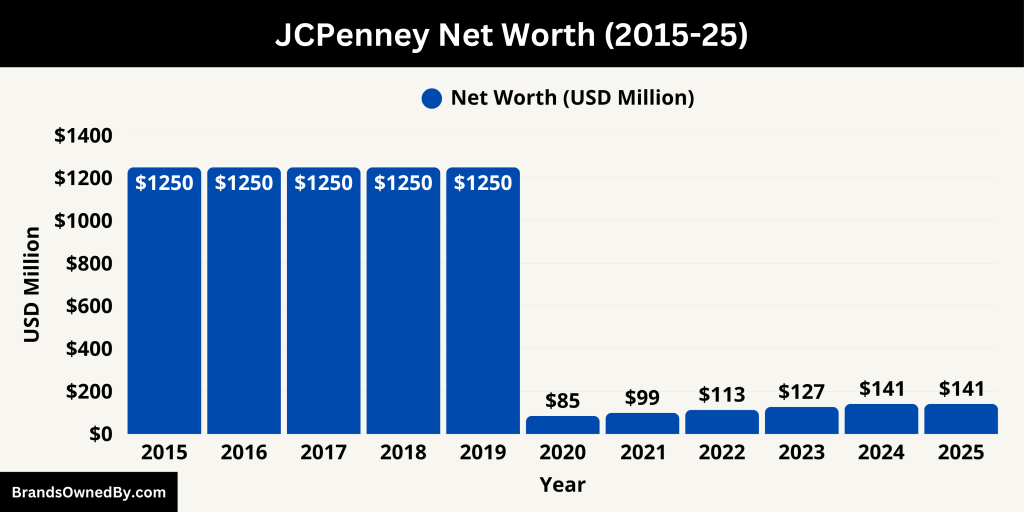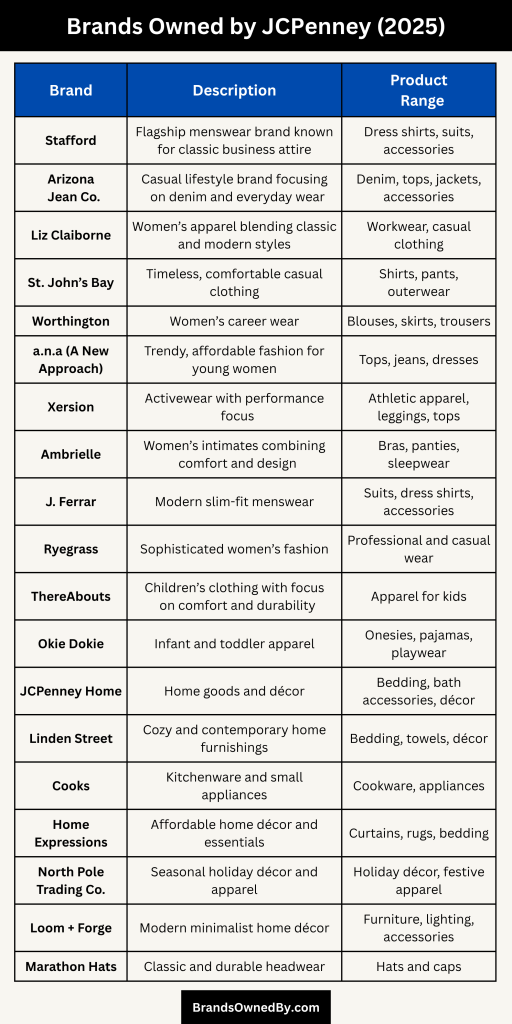JCPenney is one of America’s oldest department store chains. It has seen many ups and downs. In recent years, many have wondered who owns JCPenney after its bankruptcy and recovery. This article offers a detailed look into its ownership, leadership, value, and subsidiaries.
JCPenney Profile

JCPenney, officially known as J. C. Penney Company, Inc., is a longstanding American department store chain. It is best known for selling clothing, home furnishings, appliances, jewelry, cosmetics, and more. JCPenney has a strong legacy in American retail and once operated more than 1,000 stores across the United States and Puerto Rico.
Founded in 1902 by James Cash Penney, the company started as a small dry-goods store. It grew rapidly during the 20th century and became a household name, especially due to its catalog business and focus on middle-income American families.
Though it faced many challenges from changing consumer habits and e-commerce competition, JCPenney remains active in the retail space. It now operates as a privately held company under new ownership and leadership.
Company Details
- Full Name: J. C. Penney Company, Inc.
- Founded: April 14, 1902
- Founder: James Cash Penney
- Headquarters: Plano, Texas, USA
- Industry: Retail
- Product Categories: Apparel, accessories, footwear, jewelry, home goods, cosmetics, appliances
- Current CEO: Marc Rosen (since 2021)
- Ownership: Privately owned by Simon Property Group and Brookfield Asset Management
- Former Ticker Symbol: JCP (NYSE)
- Revenue Model: In-store sales, online sales, private-label brand sales
- Number of Employees: Estimated to be between 50,000 and 60,000 (fluctuates with store count and season)
- Store Count: Over 650 stores still operating as of 2024.
Major Milestones
- 1902: James Cash Penney opens the first store in Kemmerer, Wyoming, called The Golden Rule Store.
- 1913: The company is renamed J. C. Penney Company, Inc., with headquarters in Salt Lake City, Utah.
- 1929: JCPenney becomes a publicly traded company on the New York Stock Exchange.
- 1963: Launches its first catalog, helping it reach rural customers nationwide.
- 1971: Moves its corporate headquarters to Plano, Texas.
- 1998: Launches its online store, JCPenney.com, as part of its early push into e-commerce.
- 2011–2013: The company tries to reinvent itself under CEO Ron Johnson, eliminating sales and introducing a new pricing model. The strategy fails and sales decline sharply.
- May 2020: Files for Chapter 11 bankruptcy protection due to long-term sales decline and the impact of COVID-19.
- December 2020: Acquired by Simon Property Group and Brookfield Asset Management, exiting bankruptcy and becoming a privately owned business.
Who Owns JCPenney: Top Shareholders
As of 2025, JCPenney operates under the umbrella of Catalyst Brands, a conglomerate formed through the merger of JCPenney and SPARC Group. This merger has introduced a diversified ownership structure, bringing together several prominent stakeholders.
This merger brought together several iconic retail brands, including Aéropostale, Brooks Brothers, Eddie Bauer, Lucky Brand, Nautica, and JCPenney’s private labels like Stafford, Arizona, and Liz Claiborne. Catalyst Brands boasts over $9 billion in revenue, 1,800 store locations, and a workforce of 60,000 employees.
The ownership structure of Catalyst Brands comprises four major stakeholders:
| Shareholder | Description | Role in Ownership |
|---|---|---|
| Simon Property Group | Leading real estate investment trust (REIT) in the U.S. | Co-acquired JCPenney in 2020; major stakeholder in Catalyst Brands |
| Brookfield Corporation | Global asset manager with investments in real estate, infrastructure, and private equity | Co-investor in 2020 acquisition; strategic and financial oversight |
| Authentic Brands Group (ABG) | Brand development and marketing company managing dozens of retail brands | Owner of SPARC Group; indirect stakeholder in Catalyst Brands |
| Shein | Online fashion retailer with global reach | Recent stakeholder, brings e-commerce expertise to Catalyst Brands |
Simon Property Group
Simon Property Group, a leading real estate investment trust (REIT), has been instrumental in JCPenney’s journey post-bankruptcy. In December 2020, Simon, in collaboration with Brookfield Asset Management, acquired JCPenney’s retail and operating assets, aiming to stabilize the retailer and preserve its presence in shopping malls.
With the formation of Catalyst Brands in January 2025, Simon Property Group continues to hold a significant stake, leveraging its extensive experience in retail real estate to support the conglomerate’s operations.
Brookfield Corporation
Brookfield Corporation, formerly known as Brookfield Asset Management, is a global asset management firm with diverse investments across real estate, infrastructure, and private equity. Alongside Simon Property Group, Brookfield played a pivotal role in acquiring JCPenney’s assets during its bankruptcy proceedings in 2020.
As a key shareholder in Catalyst Brands, Brookfield contributes its financial expertise and strategic oversight to the conglomerate’s operations.
Authentic Brands Group
Authentic Brands Group (ABG) is a brand development, marketing, and entertainment company that owns a portfolio of global media, entertainment, and lifestyle brands. ABG is a stakeholder in SPARC Group, which merged with JCPenney to form Catalyst Brands. Through this merger, ABG indirectly holds a stake in Catalyst Brands, bringing its brand management acumen to the conglomerate.
Shein
Shein, a global online fashion and lifestyle retailer, is among the shareholders of Catalyst Brands. The inclusion of Shein as a stakeholder introduces a digital-native perspective to the conglomerate, potentially enhancing its e-commerce capabilities and online reach.
Who is the CEO of JCPenney?
As of 2025, Marc Rosen serves as the Chief Executive Officer (CEO) of both JCPenney and its parent company, Catalyst Brands. He assumed the role of JCPenney’s CEO in November 2021 and was appointed CEO of Catalyst Brands following its formation in January 2025 through the merger of JCPenney and SPARC Group.
Catalyst Brands encompasses a portfolio of retail brands, including Aéropostale, Brooks Brothers, Eddie Bauer, Lucky Brand, Nautica, and JCPenney’s private labels such as Stafford, Arizona, and Liz Claiborne.
Leadership and Strategic Vision
Marc Rosen brings over 25 years of experience in retail and e-commerce to his leadership roles. Prior to joining JCPenney, he served as Executive Vice President and President of Levi Strauss Americas at Levi Strauss & Co., where he led commercial operations for brands like Levi’s, Dockers, Signature by Levi Strauss & Co., and Denizen.
He also headed the company’s Digital Enterprise Office, driving its global digital strategy. Before his tenure at Levi Strauss, Rosen spent 14 years at Walmart Inc., ultimately serving as Senior Vice President of Global E-commerce.
Under Rosen’s leadership, JCPenney has embarked on a comprehensive transformation strategy aimed at revitalizing the brand and enhancing customer experience. This includes a $1 billion investment by the end of 2025 to remodel stores, upgrade the online shopping platform, and improve supply chain efficiency to expedite online order deliveries.
Educational Background and Board Memberships
Marc Rosen holds a bachelor’s degree from the University of Michigan and an MBA from the University of Chicago Booth School of Business. In addition to his executive roles, he serves on the board of directors for Inspire Brands, a multi-brand global restaurant company.
Past CEOs of JCPenney
Before Marc Rosen’s appointment, JCPenney underwent several leadership changes:
- Stanley Shashoua served as interim CEO in 2021 prior to Rosen’s appointment.
- Jill Soltau held the CEO position from 2018 to 2020, focusing on merchandise assortment and store experience.
- Marvin Ellison led the company from 2015 to 2018, emphasizing appliance sales and home services.
- Ron Johnson was CEO from 2011 to 2013, implementing a controversial pricing strategy that led to significant sales declines.
Each leadership transition reflected the company’s efforts to adapt to the evolving retail landscape and consumer preferences.
JCPenney Net Worth

As of May 2025, the estimated net worth of JCPenney is around $141 million.
JCPenney operates under Catalyst Brands, a conglomerate formed through the merger of JCPenney and SPARC Group. Catalyst Brands encompasses a portfolio of iconic retail brands, including Aéropostale, Brooks Brothers, Eddie Bauer, Lucky Brand, Nautica, and JCPenney’s private labels such as Stafford, Arizona, and Liz Claiborne. The combined entity boasts over $9 billion in annual revenue, 1,800 store locations, and a workforce of 60,000 employees.
Here’s an overview of the net worth of JCPenney from 2015-24:
| Year | Estimated Net Worth (USD) | Notes |
|---|---|---|
| 2015 | $1.25 billion | Based on stockholders’ equity from financial reports. |
| 2016 | $1.25 billion | Maintained equity levels amid restructuring efforts. |
| 2017 | $1.25 billion | Continued stabilization with slight operational improvements. |
| 2018 | $1.25 billion | Equity remained steady despite market challenges. |
| 2019 | $1.25 billion | Prior to bankruptcy filing, equity levels were consistent. |
| 2020 | $84.7 million | Significant decline due to bankruptcy proceedings. |
| 2021 | $98.9 million | Post-bankruptcy recovery under new ownership. |
| 2022 | $113 million | Continued growth with strategic initiatives. |
| 2023 | $127 million | Positive trajectory with improved financial performance. |
| 2024 | $141 million | Ongoing recovery and brand revitalization efforts. |
Brands Owned by JCPenney

Catalyst Brands encompasses a diverse portfolio of retail brands, JCPenney continues to own and manage its exclusive private labels and certain collaborative collections. These brands are integral to JCPenney’s strategy, offering customers quality products at competitive prices.
Below is a list of the major brands owned by JCPenney:
| Brand/Company | Description | Target Market | Product Range |
|---|---|---|---|
| Stafford | Flagship menswear brand known for classic business attire | Professional men | Dress shirts, suits, accessories |
| Arizona Jean Co. | Casual lifestyle brand focusing on denim and everyday wear | Teens and young adults | Denim, tops, jackets, accessories |
| Liz Claiborne | Women’s apparel blending classic and modern styles | Women | Workwear, casual clothing |
| St. John’s Bay | Timeless, comfortable casual clothing | Men and women | Shirts, pants, outerwear |
| Worthington | Women’s career wear | Working women | Blouses, skirts, trousers |
| a.n.a (A New Approach) | Trendy, affordable fashion for young women | Young women | Tops, jeans, dresses |
| Xersion | Activewear with performance focus | Men, women, children | Athletic apparel, leggings, tops |
| Ambrielle | Women’s intimates combining comfort and design | Women | Bras, panties, sleepwear |
| J. Ferrar | Modern slim-fit menswear | Fashion-forward men | Suits, dress shirts, accessories |
| Ryegrass | Sophisticated women’s fashion | Women | Professional and casual wear |
| ThereAbouts | Children’s clothing with focus on comfort and durability | Boys and girls | Apparel for kids |
| Okie Dokie | Infant and toddler apparel | Infants and toddlers | Onesies, pajamas, playwear |
| JCPenney Home | Home goods and décor | Homeowners and decorators | Bedding, bath accessories, décor |
| Linden Street | Cozy and contemporary home furnishings | Homeowners | Bedding, towels, décor |
| Cooks | Kitchenware and small appliances | Cooking enthusiasts | Cookware, appliances |
| Home Expressions | Affordable home décor and essentials | Budget-conscious shoppers | Curtains, rugs, bedding |
| North Pole Trading Co. | Seasonal holiday décor and apparel | Holiday shoppers | Holiday décor, festive apparel |
| Loom + Forge | Modern minimalist home décor | Contemporary style seekers | Furniture, lighting, accessories |
| Marathon Hats | Classic and durable headwear | General consumers | Hats and caps |
Stafford
Stafford is JCPenney’s flagship menswear brand, renowned for its classic dress shirts, suits, and accessories. The brand caters to professionals seeking reliable and affordable business attire. Over the years, Stafford has expanded its offerings to include casual wear, ensuring versatility for various occasions.
Arizona Jean Co.
Arizona Jean Co. is a casual lifestyle brand targeting teens and young adults. Known for its denim products, the brand also offers a range of apparel, including tops, jackets, and accessories. Arizona Jean Co. emphasizes comfort and style, making it a staple for everyday wear.
Liz Claiborne
Acquired by JCPenney in 2009, Liz Claiborne offers women’s apparel that combines classic designs with modern trends. The brand provides a variety of clothing options suitable for work and casual settings, focusing on quality fabrics and flattering fits.
St. John’s Bay
St. John’s Bay delivers timeless clothing for men and women, emphasizing comfort and durability. The brand’s offerings include casual shirts, pants, and outerwear, making it a go-to choice for everyday essentials.
Worthington
Worthington specializes in women’s career wear, offering a range of professional attire such as blouses, skirts, and trousers. The brand focuses on providing stylish and functional clothing options for the modern working woman.
a.n.a (A New Approach)
Aimed at young women, a.n.a offers trendy and affordable fashion pieces. The brand’s collection includes casual tops, jeans, and dresses that reflect current fashion trends, catering to a youthful demographic.
Xersion
Xersion is JCPenney’s activewear brand, providing performance-oriented clothing for men, women, and children. The brand offers a variety of athletic apparel, including leggings, sports bras, and moisture-wicking tops, designed for comfort during workouts.
Ambrielle
Ambrielle focuses on women’s intimates, offering a selection of bras, panties, and sleepwear. The brand combines comfort with elegant designs, catering to a wide range of sizes and preferences.
J. Ferrar
J. Ferrar provides modern menswear with a focus on slim-fit designs. The brand’s offerings include suits, dress shirts, and accessories, appealing to fashion-forward men seeking contemporary styles.
Ryegrass
Ryegrass is a women’s fashion brand that offers sophisticated clothing pieces. The brand emphasizes quality materials and refined designs, suitable for both professional and casual settings.
ThereAbouts
ThereAbouts caters to children’s clothing needs, offering a range of apparel for boys and girls. The brand focuses on comfort, durability, and playful designs that appeal to both kids and parents.
Okie Dokie
Okie Dokie specializes in apparel for infants and toddlers. The brand provides a variety of clothing options, including onesies, pajamas, and playwear, designed for comfort and ease of movement.
JCPenney Home
JCPenney Home offers a wide array of home goods, including bedding, bath accessories, and décor items. The brand focuses on providing stylish and affordable products to enhance home living spaces.
Linden Street
Linden Street is a home brand that delivers cozy and contemporary home furnishings. The brand’s offerings include bedding, towels, and decorative items that blend comfort with modern aesthetics.
Cooks
Cooks is JCPenney’s kitchenware brand, offering a range of appliances and cookware. The brand provides practical and reliable products, catering to both novice cooks and culinary enthusiasts.
Home Expressions
Home Expressions delivers affordable home décor and essentials. The brand’s product line includes curtains, rugs, and bedding, allowing customers to refresh their living spaces without breaking the bank.
North Pole Trading Co.
North Pole Trading Co. is JCPenney’s seasonal brand, offering holiday-themed décor and apparel. The brand’s festive products aim to bring holiday cheer to homes during the festive season.
Loom + Forge
Loom + Forge provides modern home décor items, focusing on minimalist designs and quality craftsmanship. The brand’s offerings include furniture, lighting, and decorative accessories that cater to contemporary tastes.
Marathon Hats
Marathon Hats, JCPenney’s first private label, offers a selection of headwear. The brand combines classic styles with durable materials, providing customers with reliable and stylish hat options.
Final Thoughts
JCPenney has undergone a major transformation. Today, it is a privately owned company under the shared ownership of Simon Property Group and Brookfield Asset Management. If you’re asking who owns JCPenney, the answer is no longer Wall Street investors but two of the biggest real estate firms in North America.
These new owners are betting on the company’s future, aiming to modernize the brand while keeping its retail footprint strong. With experienced leadership and a more focused strategy, JCPenney is trying to make a comeback in the ever-changing retail world.
FAQs
Is JCPenney a publicly traded company?
No, JCPenney is no longer publicly traded. It was delisted after its 2020 bankruptcy.
Who is the majority owner of JCPenney?
As of 2025, JCPenney is majority owned by Catalyst Brands, a joint venture between Simon Property Group and Brookfield Corporation. These two companies hold controlling stakes in the retailer after acquiring it during its 2020 restructuring.
Who are the new owners of JCPenney?
The new owners of JCPenney are Simon Property Group and Brookfield Corporation. They formed Catalyst Brands in 2025, merging JCPenney with SPARC Group and managing several retail brands under this new umbrella.
Who originally owned JCPenney?
J.C. Penney, the founder, originally owned the company after its establishment in 1902. Over the years, JCPenney transitioned to a publicly traded company with shares owned by institutional investors and the public until the recent acquisition by Simon Property Group and Brookfield.
Why did JCPenney fail?
JCPenney faced failure due to multiple factors: outdated business models, poor strategic decisions (such as pricing experiments under past CEOs), increased competition from online retailers, and failure to effectively adapt to changing consumer behaviors. Financial struggles worsened, leading to bankruptcy in 2020.
What company merged with JCPenney?
In 2025, SPARC Group merged with JCPenney to form Catalyst Brands. This merger combined multiple retail brands under one management to strengthen market position and operational efficiency.
What does JCPenney stand for?
JCPenney stands for James Cash Penney, the name of the company’s founder who opened the first store in 1902. The brand reflects the founder’s legacy in retail.
Where is JCPenney buried?
This question is often asked figuratively, referring to the company’s decline. JCPenney is not literally buried; it remains operational under new ownership as part of Catalyst Brands, aiming for revitalization.
What is the golden rule of JCPenney?
The golden rule of JCPenney reflects the founder’s philosophy: “Do unto others as you would have them do unto you.” This principle guided J.C. Penney in his business practices, emphasizing integrity and customer respect.
Who owns JCPenney in the United States?
In the United States, JCPenney is owned by Catalyst Brands, a partnership primarily between Simon Property Group and Brookfield Corporation, managing the retailer’s operations and growth.
Who is J.C. Penney founder?
J.C. Penney, the founder, was James Cash Penney. He started the first store in 1902 in Kemmerer, Wyoming, building the company into a nationwide retail chain.
Who bought JCPenney stores?
In 2020, Simon Property Group and Brookfield Corporation purchased JCPenney stores during the company’s bankruptcy process. They now operate JCPenney as part of Catalyst Brands.

